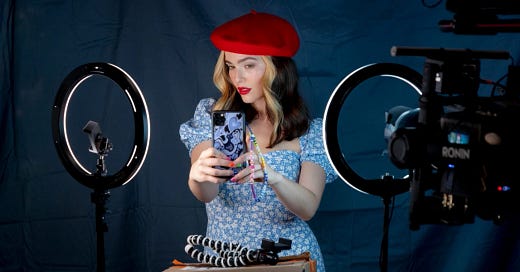Social media films seem to be the genre that has the lowest attempt-to-success rate. This phenomenon is primarily due to how movies physically cannot capture the fast-paced online world - between the time the movie is written and the time it is released, every reference could have become entirely obsolete. Even if the movie manages to still be topical by the time it hits theaters, it will not take many years before its commentary fades into obscurity and irrelevancy. Additionally, attempting to make a modern online commentary movie while living amid the modern online world often leads to a tone-deaf and reductive piece of work. Take Adam McKay’s Don’t Look Up as an example - it quite literally is the celebrity-saturated self-important distraction that it tries to warn us about. Retrospectives on past eras of the internet tend to yield a more favorable audience reaction. David Fincher’s The Social Network (though not a personal favorite of mine) is considered one of the greatest movies of the last few decades. It certainly provides commentary on social media but looks back several years into the past rather than trying to accurately capture the state of Mark Zuckerberg and Facebook in the year that the film was released. Ultimately, no matter how nuanced they try to be, most modern social media movies seem to emit the same vapid message: social media/internet/iPhones = bad. However, Quinn Shepard’s Not Okay, though flawed, is one of the most accurate and engaging depictions of the current social media landscape I have ever seen.
Danni Sanders (played by Zoey Deutch), the embarrassing and explicitly unlikeable protagonist, is a young photo editor trying to move up in the ranks of a small media company in Brooklyn. She awkwardly tries and fails to impress her coworkers and climb the corporate ladder into a writer's position. In one of her attempts, Danni manufactures a fake invitation to a writer's retreat in France, curating her social media to create a false narrative of her vacation. Tragically, a terrorist attack hits several major landmarks in Paris while she is in the midst of her farce. When barraged with concerned messages from friends and family, she doubles down on her lie instead of coming clean. Suddenly, she has all of the attention that she could ever dream of, but must examine the moral cost of how she gained it.
By most metrics, Not Okay is nothing special. It hosts enough famous cast members and influencer cameos to drum up a decent audience but doesn’t yield anything more than mediocre results. While entertaining, the plot is noticeably derivative - it closely mirrors Dear Evan Hansen and Spree, even occasionally feeling like a duller, modernized version of Scorsese's The King of Comedy. The writing is tasteless, the jokes largely fall flat, and the film boasts no memorable visuals.
Director and writer Quinn Shepard surprisingly cites Parasite and Sorry to Bother You as inspirations, but it’s hard to even place Not Okay in the same ballpark as those successful and cerebral social-satire-thrillers. Additionally, she claims that Blindspotting and Do the Right Thing influenced the film’s political edge. However, her film’s commentary on activism and youth politics read as reductive and lukewarm. One would be much more greatly affected by viewing these inspirations for Not Okay than by watching the movie itself. The character of Rowan Aldren (played by Mia Isaac) is meant to embody the spirit of youth activism and community organizing online but reads as a derivative and uninteresting version of the fictional and real-life figures she is based upon. However, though it seems generic from nearly every perspective, Not Okay approaches social media from a new lens that many other films have seemed to miss.
One significant step Not Okay takes is that it does not morally evaluate social media itself. The internet remains neutral, but what we are left to admonish or admire is how characters use it. The two main characters serve as foils for each other - Danni gains her platform through lies and manipulation and uses it for self-serving egotism disguised as care for others. Rowan gains her platform because of tragedy and uses it selflessly as a way to politically organize and drive change. Though Not Okay’s portrayal of student activism is reductive and bland, the movie proves a good point. It is hard to pinpoint any inherent bad in social media - it just amplifies the culture that we live in offline, but condemning the existence of online platforms themselves doesn’t yield any positive results.
Although Not Okay opens some new doors, it is far too conventional across the board to make for a memorable watch. It delivers a well-paced and occasionally funny 90 minutes of entertainment, but it will most likely not leave an impact, however hard it tries. Despite its title, it’s nothing more or less than just okay.
Not Okay was released on July 29 and is currently streaming on Hulu.





I think I watched this movie; let me check my letterboxd . . . .
how will this affect bubble girl